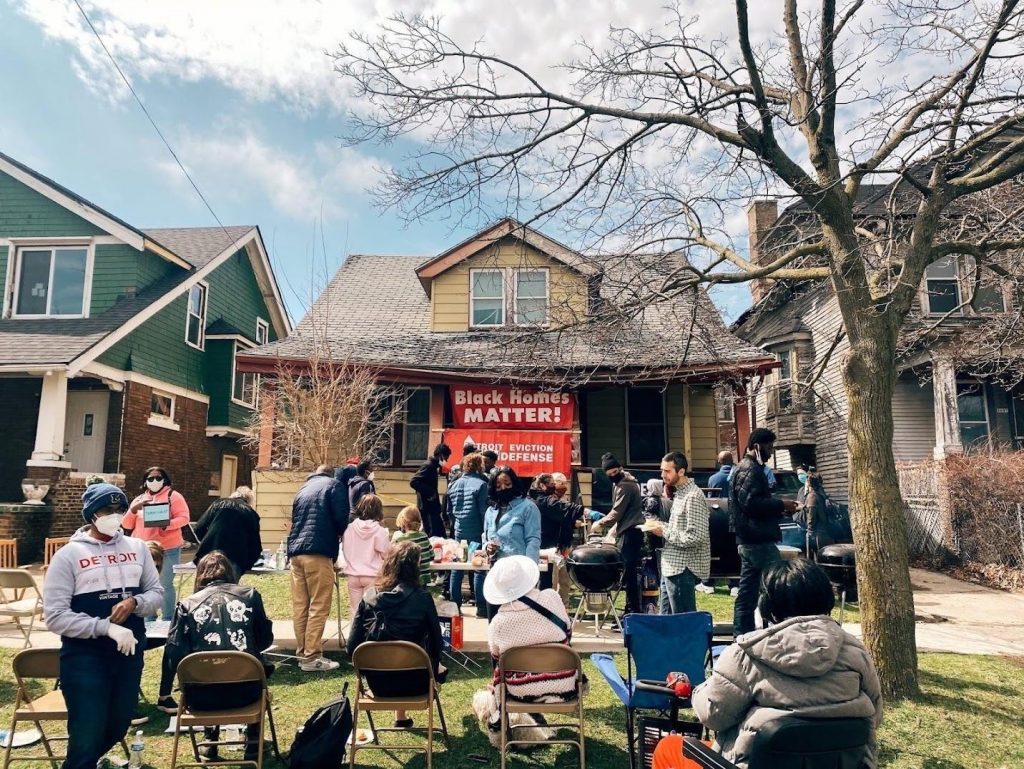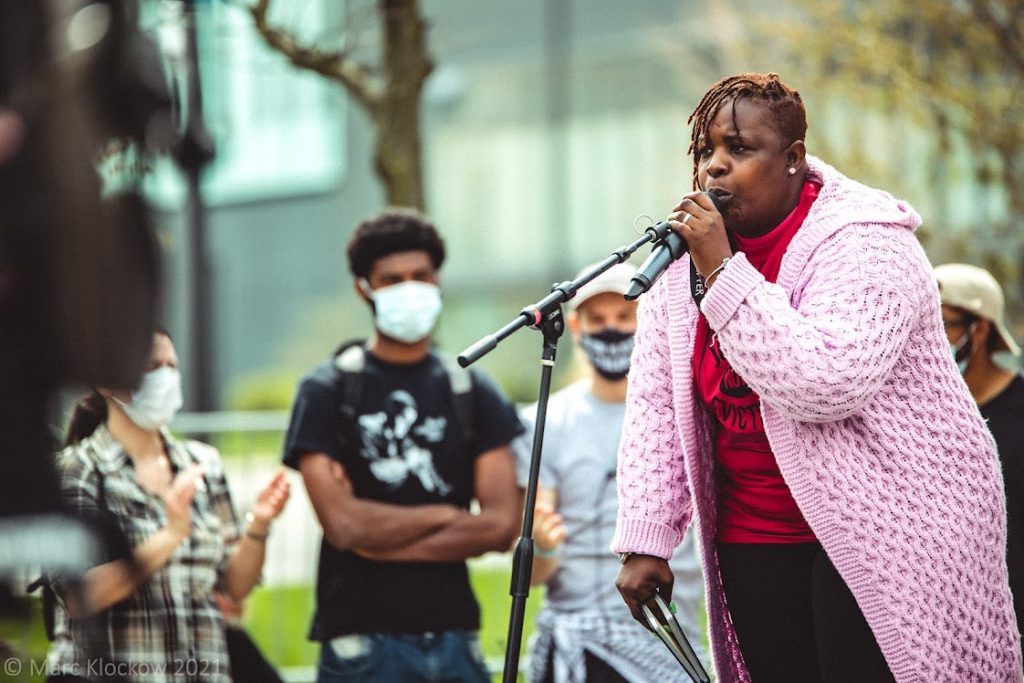The experience of Covid-19 has confirmed for some, and exposed to many, the moral bankruptcy of capitalism as a social and economic system. In the midst of this global crisis, the racist murder of George Floyd in 2020 provoked a global uprising against police brutality and systemic racism.
This moment of intense struggle opened up a space for political discussions and debates on how to create a pathway toward liberation. Within the anti-capitalist Left, one of the perspectives put forward that gained some ground was that of mutual aid. Mutual aid has been put forth as an ideal form of relief in a time of increasing climate disasters and decreasing government assistance to mitigate the effects of capitalism’s myriad other crises.
What is meant by “mutual aid”? As the capitalist-induced housing crisis deepens, for instance, a whole set of mutual aid organizations has formed that are focused exclusively on providing food and clothing to homeless people. In response to police violence, the latest rollbacks of reproductive rights, and the end of unemployment benefits and eviction bans, social media platforms fill with calls to donate to local mutual aid funds. Mutual aid, especially post-2020, is used by people and organizations with a range of different political orientations to describe their activities, all of which are loosely united by the tactic of using movement resources to help meet the needs of working-class and oppressed people. (It should be noted that there has been a broad trend of declining mutual aid activity since Spring 2020 as donations have slowed and activists have become increasingly demobilized.)
Detroit Will Breathe organizers and supporters — part of the anti-capitalist Left that has participated in the movement — have some important differences with proponents of mutual aid. These concern what strategy is best for winning liberation from the profound social, environmental, and economic crises that capitalism inherently produces. This article is written as an invitation to our comrades who have become involved in mutual aid to reflect on how to materially change conditions that we all agree are intolerable and must be transformed.
Winning is not optional. It is also not inevitable — not even if we see many more crises that are as destabilizing as the Covid-19 pandemic; not even if we see many more mass movements of people into the streets.
The 2020 uprising was the largest social movement in U.S. history, but nearly all of its demands are still unmet. Magnitude and energy alone are not enough when you are directly confronting the power and viciousness of the capitalist state — as that uprising did when it challenged the role of racist policing in enforcing the exploitation of the multiracial and multi-gendered working class in general, and the oppression of Black people in particular. Only a revolutionary socialist strategy centered on mass action by the working class and oppressed is capable of winning the transformative demands of social movements and overthrowing capitalism, therefore ensuring our collective survival.
The Difference between Tactics and Strategy
Marxist theory about the inherent internal contradictions of capitalism is sometimes misinterpreted to mean that socialism is inevitable — but it is not. Rather, capitalism’s internal contradictions mean that its eventual end, at some point, is guaranteed. However, the survival of our communities, the end of oppression, and the creation of forms of society that allow everyone to live in their full dignity and humanity can be brought about only through a process that is anything but guaranteed: the intentional actions of masses of people expressing their power as the collective subject of revolutionary transformation.
The one way that we are guaranteed to lose is if we give into disillusionment and withdraw from the necessary, and deeply human, tasks of understanding that the collective actions of the working class have the power to change the course of historical events and working together to figure out how we express that power at different stages of struggle. This is the theoretical basis of revolutionary strategy, and it must be done collectively in order for moments of class struggle to remain dynamic. Acting collectively means refusing to see the work of strategy as someone else’s job, while you do your “part” by helping in some other way.
Based on what we have seen in our day-to-day organizing, our concern is that, in the wake of 2020, debates within the U.S. Left over tactics have taken the place of debates about strategy. Tactics are methods that are used during moments of class struggle, such as protests, strikes, disruptions, and even mutual aid, among many others. Tactics are components of a strategy, and flow from a strategy, but they must never be mistaken for strategy. Strategy is the overarching plan for escalating struggle to a revolution, taking power, and transforming society.
No single tactic, no matter how diligently practiced, will ever be enough to bring about a revolution. Mutual aid can be a necessary survival tactic during and between periods of heightened class struggle, such as in times of uprisings and labor actions, but it is critical to recognize that while some may counterpose it strategically, it is still a tactic and not a strategy. There is an argument made by some proponents of mutual aid that it is, by itself, an all-in-one tactic and strategy for overcoming capitalist exploitation and ending oppression without ever having to take power. This autonomist line of thinking relies on the belief that alternate systems to capitalism can be developed alongside capitalism and can organically supplant it over time. The roots of this belief can be found in 19th-century anarchism; in its concrete 21st-century U.S. form, we also find wide-ranging crossover with the views of social democrats, neoliberals and their resilience policies for urban poverty, and some liberal social justice nonprofits.
Capitalism, by its very nature, deprives the majority of people of what they need to survive, while ensuring that a small minority can hoard wealth, resources, and power well beyond what they need. This keeps wealth and other resources from the working class and oppressed communities, even though there is more than enough to meet everyone’s needs. Even by pooling resources, this cannot be overcome, because those resources are being stolen anew every day through exploitation. Thus, the only way to confront and end this exploitation is through sustained revolutionary mass action.
It is true that mutual aid allows resources to be temporarily directed to support individuals, groups, and campaigns, and can therefore be a valuable tactic within a broader strategy that centers the power of the working class and oppressed. But as long as capitalism continues to exploit the working class and oppressed, mutual aid will never be a viable strategy for meeting everyone’s needs, or even for meeting a small group’s needs in the long term.
Movement resources are not infinite. Over the last 18 months, we have seen donations to leftist and mutual aid fundraisers rapidly slow down after briefly peaking in the spring and summer of 2020. We have also seen mutual aid organizations that were created in 2020 dissolve or become inactive as part of a generale demobilization of the movement initially sparked by the murder of George Floyd. The kind of work that was supported by a wave of donations in 2020 needs to be fortified with analyses of why donations ebb and flow and how to develop a revolutionary strategy to destroy the underlying system that withholds the basic necessities of life from the majority of people in the world.
Moreover, movement resources cannot compete with the state. If we focus solely on tactics that demonstrate the movement’s ability to pool and distribute limited resources, we open our struggles to cooptation by the state. In response to class struggle, the capitalist state will often make concessions to the working class and oppressed — for instance, Biden’s stimulus plan — as a way to pacify and demobilize social movements, even temporarily, and head off their more radical demands. Such concessions are always inadequate, but the state is still able to distribute them on a scale that is incomparably larger than anything we can do through mutual aid.
We are concerned that many people who have been radicalized by conditions in the United States in the years and decades leading up to 2020, and who have found a way to contributing to anti-capitalist struggle through mutual aid, will be eventually led into burnout, and then disillusionment, by the failure of mutual aid alone to affect substantively the real balance of power between the oppressor and the oppressed — even on the local level. Debating strategy can actually be a remedy for burnout among organizers and participants in class struggle, because it helps us all understand whether and how our day-to-day tactics contribute to the kind of transformation we envision and that brought many of us to act in the first place.
The Fight for Power
As Frederick Douglass said so potently, “Power concedes nothing without a demand.” Capitalism connects wealth and social power. What appears as the hoarding of wealth by the privileged is in fact a relationship of power between the bourgeoisie and the working class, mediated by society and the state. Accumulating wealth through finance or ownership of a business with employees is really a relationship of command over other peoples’ labor, and therefore, a form of social power. We see an example of this in how Amazon is able to leverage massive tax breaks from municipalities by promising jobs, and then leverage the threat of unemployment over employees who want to unionize.
Power, it is important to note, is not something that exists outside of people and corrupts them unless they refuse it. The unequal distribution of power is an effect of the inherent inequality of capitalism, not an inherent danger of power itself. Maintaining inequality requires constant violence on the part of capitalist institutions, vigilantes, and the state.
Power cannot and will never be given up willingly by the capitalists. Capitalism is not just an economic system based on domination. It is a system that is coercive by nature. On the one hand, it coerces workers and the oppressed to engage in wage labor to survive by depriving them of the ability to meet their needs and forcing them to engage in wage labor. This is further enforced through forms of state intervention such as police protection of private property, the criminalization of homeless encampments, property tax foreclosures, student loans, and work requirements for welfare. On the other hand, it continually gives rise to economic and social crises that compel the capitalists to expand and make their exploitation of the working class and oppressed harsher because they have no middle ground: if they cease to expand and reformulate the ways that they benefit materially and socially from other peoples’ labor, they will be supplanted by other capitalists who do.
This all-encompassing coercive dynamic is why small-scale experiments in “freedom” and “self-sufficiency” will always be short-lived and doomed to fail. The only alternative that avoids this fate is a strategy for mass action that is centered on the fight for power. Community survival matters within that strategy, and tactics such as mutual aid can play an important, supportive role in the fight, but it can only be a partial means to an end and not an end in itself. Revolutionary strategy must be in the forefront, a focus on building the self-organization of the working class and oppressed must be central, and demands that are directly confrontational to the state must be amplified. Imagine eviction defense that goes beyond traditional mutual aid to include tenants and neighbors formulating and carrying out round-the-clock defense that also has a broader political perspective and demand. Imagine pairing legal aid for victims of police brutality with a campaign to demand accountability while calling into question the systemic role and function of policing.
We have a recent example from our organizing in Detroit: the campaign to buy back the house of Geraldine Smith-Bey, which was stolen by Wayne County through a tax foreclosure auction. The tax foreclosure system in Detroit has stolen thousands of homes through illegal over-assessment of property taxes followed by state seizure and auction of the properties. Wayne County sold Geraldine’s home to a predatory “nonprofit” for $1200. Storehouse of Hope, the buyer, claims to help Detroiters who lose their homes buy them back, through its “Community Land Trust.” But what it does instead is collect rent from former homeowners while failing to maintain their properties or even pay taxes.
Geraldine was trapped as a tenant in her own home with no chance to buy it back. Meanwhile, Storehouse of Hope fundraised in the name of dispossessed Detroiters and was celebrated as an example of public-private partnerships solving the housing crisis. After years of trying everything to resolve her situation privately, Geraldine realized that it was necessary to fight back publicly. The organizations Detroit Eviction Defense, Detroit Will Breathe, and the Charlevoix Village Association joined Geraldine’s fight and supported a campaign around her demands to get her house back and call out Storehouse’s hypocrisy.

The campaign’s strategy was to organize masses of people to confront and expose the complicity of nonprofits with the state in profiting from racist displacement. Tactics included community cook-outs with neighbors, fundraisers, rallies where Geraldine and others spoke about their struggles against nonprofit landlords, and confrontational actions such as pickets targeting Storehouse of Hope to force the nonprofit to enter negotiations. After several months of organizing, during which she was threatened with eviction and demolition, Geraldine was able to buy her house back last year with funds raised during the campaign. This tangible win went beyond community support of someone facing housing insecurity to demonstrate the power of self-organization independent from capitalist institutions like liberal nonprofits.
Zanon, a factory in Argentina that has been worker-owned for more than 20 years, offers an international example of pairing mutual aid-adjacent tactics with revolutionary strategy. In response to the threat of closure, workers occupied the plant and class struggle escalated; workers ended up in control of the factory. Comrades of the Party of Socialist Workers (PTS), the group in Argentina that is part of the Trotskyist Fraction–Fourth International (FT-CI) are among the workers in that factory. As they help keep it running under workers’ control, they do so with a clear understanding that it is not enough simply to duplicate this experience, which was only possible under specific circumstances. The FT pursues socialist revolution as a strategy in Argentina and uses the additional tactics of running for office, helping workers and students self-organize to defend their rights and gains and waging campaigns against the IMF and for democratic rights.
Ultimately, mutual aid cannot be a revolutionary strategy. It has serious tactical limitations, especially when it is employed standalone. Yes, mutual aid can be a useful tool if tied to a broader strategy aimed at organizing and mobilizing the social power of the working class and oppressed in a struggle for power.
Socialism will not be achieved solely through the work of mutual aid organizations. It will require a revolution, with a confrontational revolutionary strategy that utilizes tactics of direct action: strikes, walkouts, protests, and so on. Our hope is that this article will inform the strategy of revolutionaries everywhere and inspire collaboration with mutual aid organizations based on working-class independence and the fight for power.










